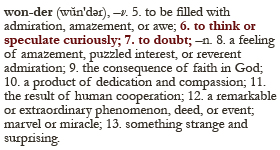Prayer is woven throughout the Book of Judith. Supplications, praise and blessings serve as the theological fulcrum of the book. The collective prayers of the people of Israel are heard at the beginning of the story. As the news of Holofernes’ plan begins to spread, we are told that with one voice the Israelites —“men, their wives and children, their livestock, and every resident foreigner, hired laborer, and slave”—cried to God with great fervor, fasting and humbling themselves (Judith 4:9).
When the pleas of the people seem of no avail, the leaders of Bethulia turn to Judith and ask her to pray. Judith is described as beautiful, wise and God-fearing. Her wisdom comes to the fore immediately as she explains the premise upon which all prayer is based. She stresses that it is not for human beings to impose conditions on the Lord. She summons the nation to call upon God to help them and says that “He will listen to our voice, if he is so disposed” (8:17).
After making this point clear she then agrees to pray for rain and for the city under siege. Judith informs the people that she will go her own way and hopes that in the period of five days she will gain the desired result. “The Lord, through her intervention, will look upon the city and deliver it from the enemies” (8:32-33).
In the following scene, Judith bares her soul. She asks God for salvation and to allow her to sanctify His great name; understanding her role as an enabler:
By the guile of my lips strike down the slave with the ruler, and the ruler with his servant. Break their pride by the hand of a female! For Your strength does not depend upon numbers nor Your might upon powerful men. Rather, You are God of the humble; You are the ally of the insignificant, the champion of the weak, the protector of the despairing, the savior of those without hope.
Please, please, God of my father and God of Israel’s heritage, ruler of heaven and earth, creator of the waters, king of all Your creation, hear my prayer: Grant me a beguiling tongue for wounding and bruising those who have terrible designs against Your covenant and Your sacred house, even against Mount Zion and the house Your children possess. Demonstrate to every nation and every tribe that You are God, the God of all power and might, and there is no one who protects the people of Israel but You.”
(Judith 9:10-14)
In her prayer, Judith does not emphasize the imminent surrender and capture of Bethulia. Rather it is Jerusalem and God’s dwelling which are brought to God’s notice. She prays for the success of her mission, but not for her own physical survival or honor, but rather the honor of her people and her God.
Twice in her prayer, she stresses the fact that she is a widow. This point is significant insofar as the widow in biblical society is to be protected. “You shall not ill-treat any widow or orphan. If you do mistreat them, I will heed their outcry as soon as they cry out to Me, and My anger shall blaze forth and I will put you to the sword…” (Exod 22:21-23). Judith, a widow, hopes that her status will evoke God's mercy for the entire nation.
Moreover, Judith's vulnerable status stands in sharp contrast to the daunting Assyrian army and its commander-in-chief. Contrary to Holofernes’ idea that power is based on military strength (5:3, 9:7), the people of Israel are portrayed as relying upon their God, who affords strength to the powerless. This aspect is reminiscent of the similar theme in the story of Hanukkah—the triumph of the few and weak Maccabees over the large and strong Greek army.
It is precisely these points, which Judith expresses in her prayer:
For Your strength does not depend upon numbers nor Your might upon powerful men. Rather, You are God of the humble; You are the ally of the insignificant, the champion of the weak, the protector of the despairing, the savior of those without hope.
(Judith 9:11)
Following her prayer, Judith beautifies herself and sets out across the valley to the Assyrian encampment, pretending to be a Hebrew woman escaping the siege and defecting to the Assyrian side. She asks to meet with Holofernes in order to help him with his attack. While staying with Holofernes, Judith makes a point of telling him that she will go out every night to pray (11:17).
One evening, following a banquet during which Holofernes becomes drunk, Judith is alone with him in the tent. She tells her maid to stand outside “and wait for her to go out as she did on other days; she had said that she would be going out to pray.” (13:3)
Standing quietly beside Holofernes’ bed, Judith silently prays for God’s help to make her plans successful:
Lord, my God, source of all power, have mercy on me for what my hands must do for Jerusalem to be a living example of trust in your covenant. Now is the time to renew our heritage, give my plan life, to surprise the enemies, to bring them to their knees who’ve risen up all around us great herds coming to devour us.
(13: 4-5)
Judith then beheads Holofernes with his own sword. As she stands above him, sword in hand, her left hand seizing his hair, she cries:
Make me steel, Lord, God of Israel—today!
(13:7)
At this point, Judith’s habit to go out and pray in the valley becomes a perfect excuse to safely leave the camp:
The two women walked out together just as they usually did for prayer. They passed through the camp, walked straight across the valley, climbed the mountain to Bethulia and approached the city gates.
(13:10)
The remainder of the prayers in the book of Judith consists of songs of praise and thanksgiving. Upon her successful return to Bethulia, Judith sings a song of victory, taking up the traditional role of a woman after battle, while at the same time extolling her own important role in the events.
Judith’s choice to pray prior to her mission can be compared to that of another heroine, faced with a similar mission -- Queen Esther. Esther, an exile, an orphan and a woman forced to disguise her ethnicity rises through providence and personal courage, to royal estate and brings about the deliverance of her threatened nation. Esther is asked by her uncle Mordecai to approach the King Ahasuerus and save the Jews from the evil decree of Haman who threatened to annihilate all of the Jews. Esther’s story is well-known from the holiday of Purim, which celebrates the subsequent victory of the Jews over their enemies. Esther's deliverance is recorded in the Scroll of Esther.
The similarities between the books of Judith and Esther are extensive—starting with the fact that in both a Jewish heroine uses her courage and resourcefulness to save her people from imminent destruction at the hands of a powerful ruler. Both are described as beautiful women, who make use their femininity to save the day. Esther and Judith each have a special personal status – Esther is an orphan, while Judith is a widow – and are therefore protected in Jewish society, but also marginalized through their lack of position in a family unit. Both women also make use of their magnificent rhetorical skills, evident in their speeches to Ahasuerus and Holofernes respectively.
Though the heroines have much in common, there are many differences in the settings and in the purposes of the two books. One of the most striking is that canonical Book of Esther surprisingly makes no mention of God, historical landmarks, election of Israel, and contains no explicit prayers.
Talmudic literature even debated the efficacy of including Esther in the biblical canon, given how much militated against it. In the final analysis, the book became an integral part of scripture. One explanation of this choice may be its unique presentation of miracles.
The Book of Esther is a drama of coincidences. Consider the sequence of events: the timely vacancy of queenship, the auspicious accession of a Jewess to the throne, Mordecai's discovery of the eunuchs' conspiracy, Esther's propitious reception by Ahasuerus, the king's insomnia, Haman's early arrival, his plea for mercy at Esther's bed.
But as all readers of epic tales know, there is no such thing as coincidence. As Jon D. Levinson points our: “Coincidence is a miracle in which God prefers to remain anonymous.” Just as Esther's Jewish identity was hidden, so too the identity of the real power behind the throne – God, the savior of Israel – is masked. In this tale, God works behind the scenes.
Although the Hebrew scroll of Esther does not explicitly say that Esther prayed to God before she dared present herself to the king unannounced, it is intimated when she says to Mordecai:
Go and gather all the Jews now in Susa and fast for me. Don’t eat or drink for three days, either day or night; and I, with my maids, will fast as you do. In this condition I’ll go to the king, even though it’s against the law. (Esther 4:16)
It may very well be that Esther was asking for the Jewish community to pray for her, although this is not directly specified.
What is conspicuously absent in the Hebrew original is added both in midrashic sources and in the Greek additions to Esther.
Midrash Tehillim explains “Esther… stood in the inner court of the king’s palace” (Est. 5:1) as standing in prayer:
At that hour Esther said [to the Almighty] “My Lord, My Lord why have You forsaken me?”: ‘Don’t leave me, for danger is near, and there is no aid.’
(Midrash Tehillim, 22:24)
Elsewhere the Rabbis elaborate:
She prayed before the Holy One blessed be He and said: “And how is it that for our matriarch, Sarah, who was taken hostage by Pharaoh for only one night, he [Pharaoh] suffered, he and his whole house… and I, who have been in the bosom of this evil one all these years, You do not generate miracles for me? My Lord, my Lord- why have You left me?
(Midrash Tehillim, 16)
Prayer was viewed as so essential to the text that in the second century in Alexandria a Jew named Lysimachus decided to fill in the blanks and supply the missing religious content. He composed Additions to Esther, which were subsequently incorporated into the Greek Bible.
One of these additions is Esther's prayer:
Then she entreated the Lord, God of Israel saying: My Lord, You alone are our king. Help me who am alone and have no help but You. For I am taking my life in my hands. From my earliest childhood in my family's tribe, I have been hearing that You, Lord, took Israel from all the nations, and their fathers from all their ancestors, as an everlasting heritage and that You did for them just as You had promised. But now we have sinned against You and You have handed us over to our enemies. Because we gave glory to their gods... Rescue us by Your power, and help me, who am alone and have no one but You, O Lord... You have knowledge of all things. You know that I hate the pomp of the lawless and abhor the bed of the uncircumcised or of any foreigner...Your servant has never dined at Haman's table, nor have I extolled the king's banquets or drunk the wine of libations. From the day my status changed until now, Your servant has not delighted in any but You, O Lord, God of Abraham. O God whose power prevails over all, listen to the voice of those who are without hope and rescue us from the hand of the wicked. And deliver me from my fear!
(Add. C: 14-17, 25-26, 28-30)
Esther’s prayer, like Judith’s, is appropriate for her circumstances. Although these women perform acts which dramatically differ in their harshness (Esther uses her feminine wiles without "staining her hands" while Judith resorts to brutality), they both turn to prayer to express the service of their hearts.
Both prayers employ the particular yet similar power of the heroines: courage and persuasiveness for Esther, and strength and guile for Judith. Both women pray more for the redemption of the nation which transcends their personal desire for well being.
Judith's prayer is an integral part of her book, while Esther's was added in the Apocrypha.
But even without these Apocryphal additions, the story of Esther is a courageous drama of intense faith. When Mordecai appeals to Esther he makes it perfectly clear:
Don't imagine that you alone of all the Jews will escape because you are in the king's palace. On the contrary, if you really do remain silent in such a time as this, relief and deliverance will arise for the Jews from another quarter, but you and your father's family will perish. And who knows? Perhaps it is just for such an occasion as this that you have attained to royal estate! (Esther 4:13-14)
Esther selflessly replies: ‘Then I shall go to the king, though it is contrary to the law and if I am to perish, I shall perish!’
The Book of Esther may not contain overt references to the God of Israel, but its religious value cannot be understated. The story is a tribute to the power of faith and courage. In the words of biblical scholar Michael V. Fox:
The willingness to face history with an openness to the possibility of providence - even when history seems to weigh against its likelihood, as it did in the dark days after the issuance of Haman's decree - this is a stance of profound faith.
Be that as it may, what is covert in the Book of Esther is overt in the Book of Judith. In fact, scholars have suggested that the book of Judith itself may have been a reaction to that which was missing in Esther.
Ironically, it is the Hebrew book of Esther that was accepted into the biblical canon, while the book of Judith (as well as the Greek additions to Esther) was consigned to the Apocrypha. Yet, Judith’s story is a powerful testimony to the efficacy of prayer, and she is a heroine for all time.










